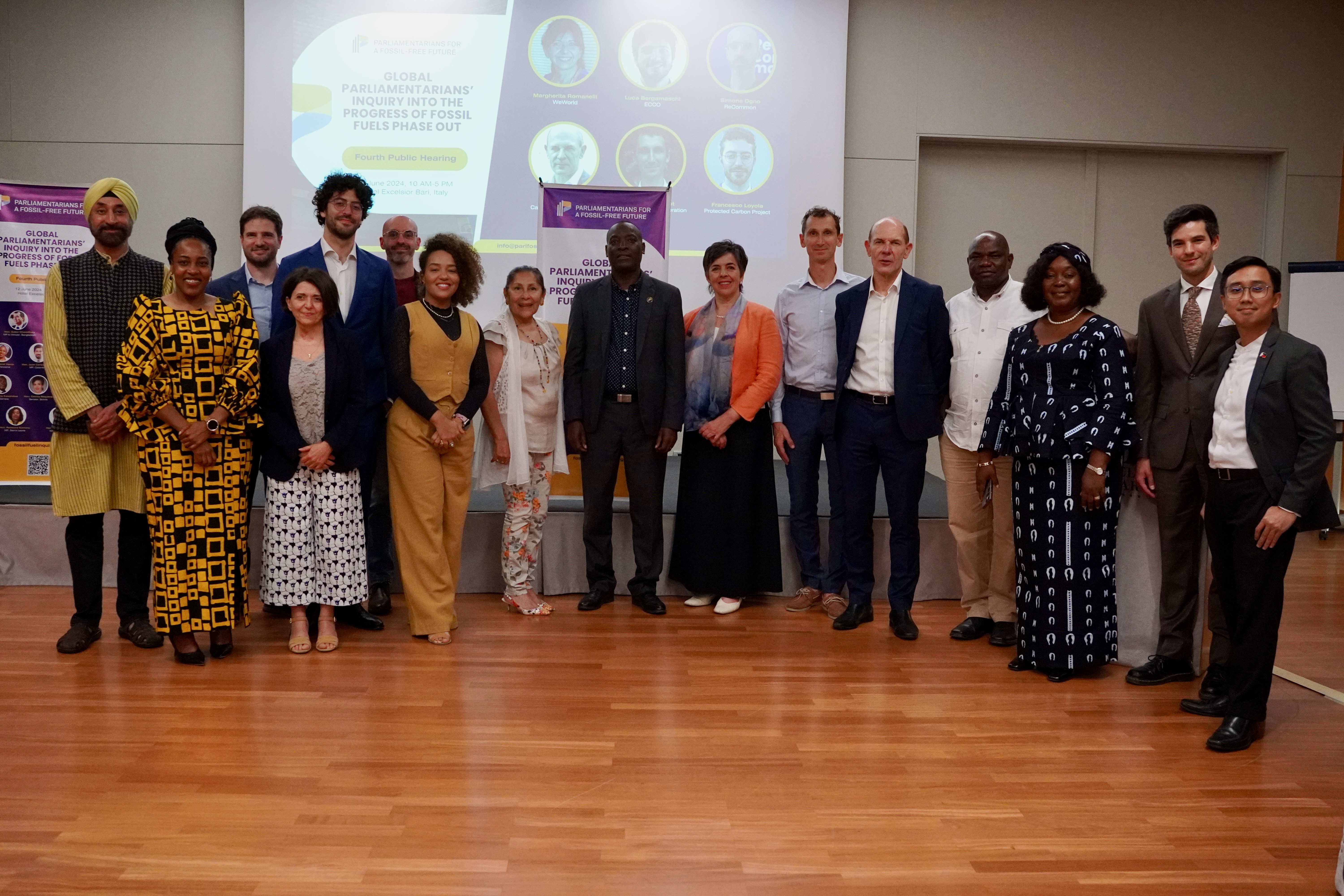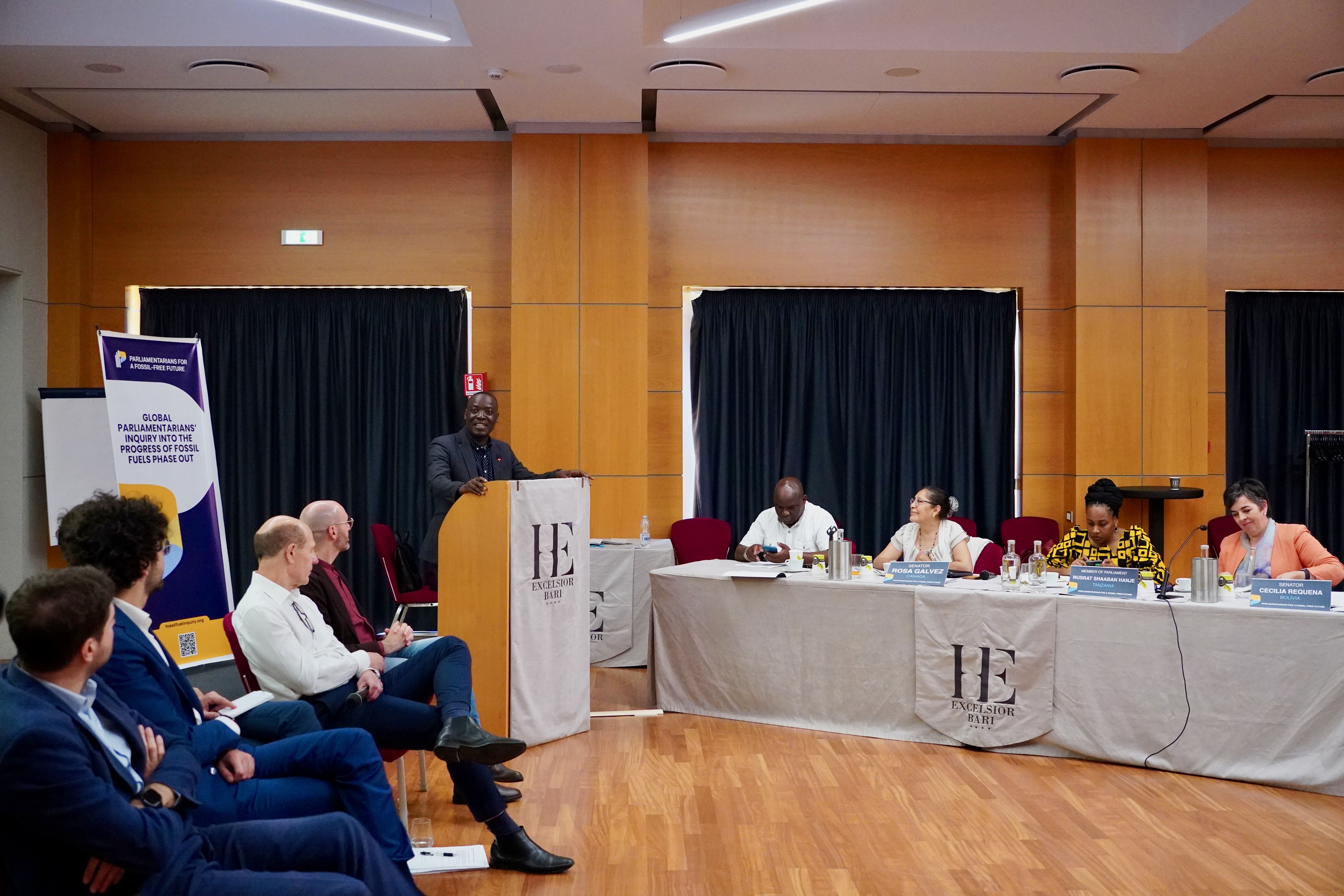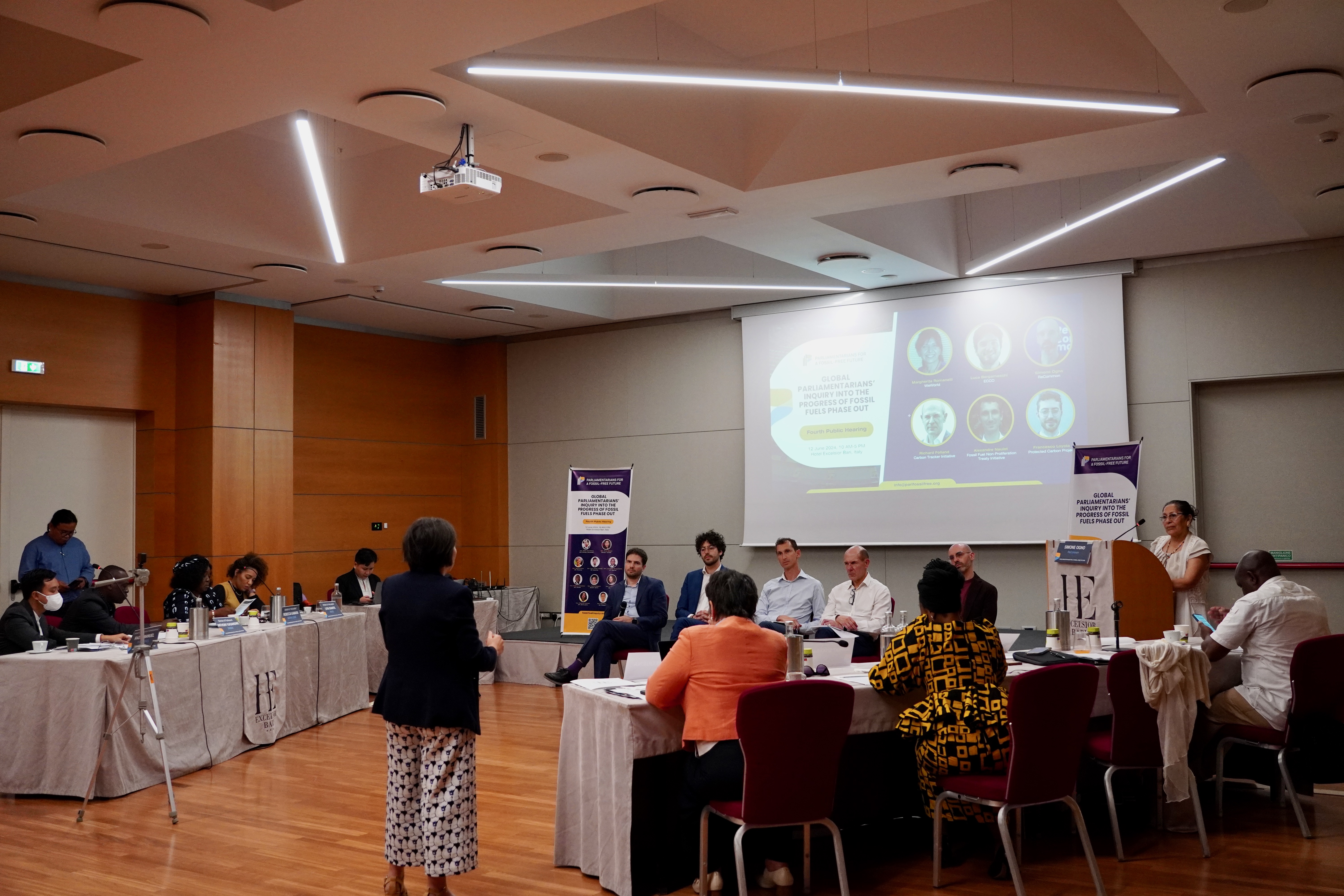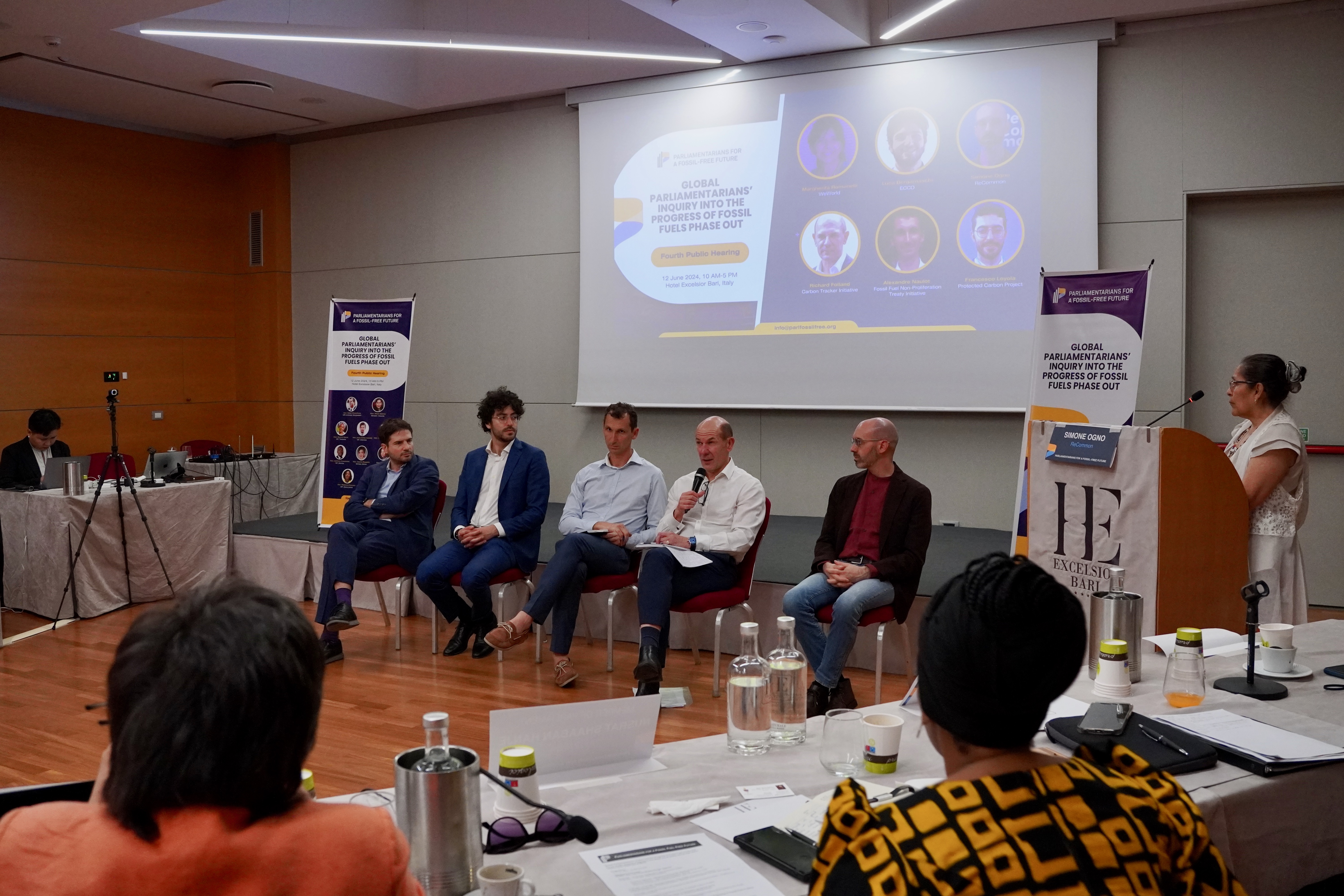BARI, Italy, 13 June 2024 — In a powerful call to action
on the eve of the G7 summit, Members of Parliaments from around the world
gathered here yesterday to call on the world’s richest economies to phase out
fossil fuels and fast-track renewable energy.
Over 50 parliamentarians have signed on to a statement
demanding a full, fast, fair, and funded transition away from coal, oil, and
gas, and holding the G7 accountable. This statement comes on the heels of the
fourth hearing of the Global Parliamentarians’ Inquiry into the Progress of
Fossil Fuels Phase Out, highlighting the urgency for action.

“The final session of the Global Parliamentarians’
Inquiry into a Fossil Fuel Phase Out demonstrates a shared commitment to the
urgent task of tackling the climate crisis with the scale, solidarity, and
urgency it demands,” said US Senator Ed Markey. “On the eve of the G7, this
commitment is more critical than ever. The G7 countries account for more than a
quarter of current global oil, gas, and coal production but have the capacity
and responsibility to phase out fossil fuels. As parliamentarians, we will continue
to push for a cleaner, healthier, and more just future.”

G7 Funding Fossil Fuels Over Clean Energy
The largest economies continue to bankroll the climate
emergency and shirk from their duty to fast-track clean energy. G7 countries
prioritize fossil fuels over clean energy, with a staggering $25.7 billion
pumped into fossil fuel projects annually, compared to a mere $10.3 billion in
clean energy. Additionally, G7 countries provided a shocking $200 billion in
fossil fuel subsidies in 2022, while major G7-based banks financed a staggering
$700 billion in fossil fuel projects last year alone.

“The G7’s continued financing of fossil fuels is a
blatant contradiction of their climate commitments and the Paris Agreement,”
said Canada Senator Rosa Galvez. “They have the power and responsibility to
lead the global phaseout, and have prioritized energy transition in their
Leader’s Summit, yet they’re backtracking on their own promises.”
Developing Nations Demand Action
“The historic decision at the COP28 climate conference in
Dubai to ‘transition away from fossil fuels’ has seemed to become little more
than a faint memory. The world must seize the moment to phase out fossil fuels
for good, and G7 countries can and must lead by example,” said Tanzania MP
Nusrat Hanje.
“We have made some progress but we have work to do at
COP29 in Baku & COP30 in Belem. We need to hold the G7 to account. We need
to move from billions to trillions in climate finance, including the energy
transition,” said Bangladesh MP and Minister of Environment, Forests and
Climate Change Saber Chowdhury.
“Vulnerable countries and communities cannot afford to
wait for 2050 for the G7 to commit to a fossil fuel phaseout and a rapid
transition to renewable energy systems. These countries must also uphold a just
transition, scale up their delivery of climate finance, and strengthen their
Nationally Determined Contributions,” said Zambia MP Anthony Kasandwe.
A Call to Seize the Moment
“The recent G7 communiqués are widely perceived as
inadequate, replete with loopholes and their countries have continued to renege
on their commitments. We cannot afford to be unambitious. We have to act now,”
said Philippines MP Raoul Manuel.
“The G7 plays a very big role to fund climate action
including renewables. But how much of this money is reaching the hotspots? Can
we listen to each other to find a way forward for humanity?” asked Uganda MP
Lawrence Biyika Songa.
“G7 countries just don’t want to walk the talk. We need
to engage finance ministries and be involved in budget discussions. We need to
work with civil society more,” said Sierra Leone MP Rebecca Yei Kamara.
Launching the Amazon Inquiry
The hearing was held back to back with a preview of the
Global Parliamentarians’ Inquiry for a Fossil-Free Amazon, which aims to
pressure governments, public institutions and corporations within and working
in the region to scale up pledges and actions to stop oil and gas expansion in
the world’s largest rainforest.
“It is urgent that we protect the Amazon from industrial
activity and global warming. We must therefore phase out fossil fuels in the
region and globally. Oil and gas production in the region has caused not only
environmental degradation but also social destabilization, health impacts,
human rights violations, and corruption. We need to find out who funds and who
benefits from the exploration, and we need to make them accountable,” said
Brazil MP Livia Duartee, who hails from Belem.
“Through the new Amazon inquiry, we aim to investigate
progress in the fossil fuel phaseout in the Amazon region and explore
opportunities for phasing in renewable energy in a just and equitable manner,”
said Bolivia Senator Cecilia Requena.
A recent study shows that from 2016 to 2023, 38 of the
world’s 60 largest banks have financed oil and gas exploitation in the Amazon
to the tune of $11.15 billion. Twenty-four of the 38 banks are from the G7 and
have bankrolled 80% of the total.
Brazil MP Livia Duarte, Bolivia Senator Cecilia Requena,
and Canada Senator Rosa Galvez led the media launch in Bari. They are joined in
the Amazon inquiry committee by Brazil MPs Célia Xakriabá and Ivan Valente,
Colombia MPs Andres Cancimance and Juan Carlos Lozada, Ecuador MP Jahiren
Noriega, and Peru MPs Sigrid Bazan and Ruth Luque.
The inquiry will be formally launched in August, the
first-year anniversary of Ecuador’s popular consultation vote to stop and ban
oil exploitation in Yasuní National Park in the Amazon. Hearings and other
related activities will be held from 2024 to 2025, with the outcomes scheduled
to be presented prior and during COP30 in Belem.
Provided by Veritimes

